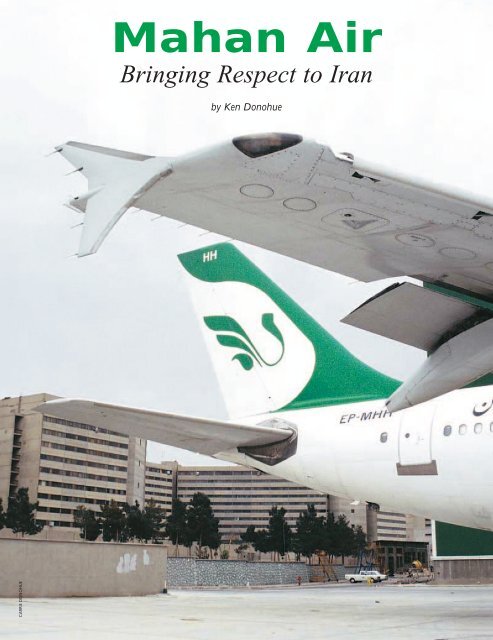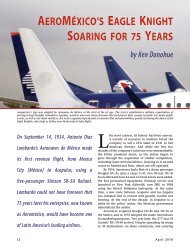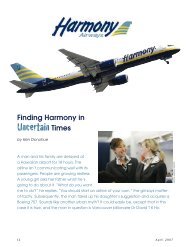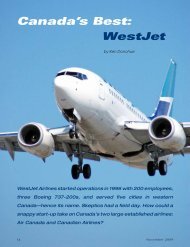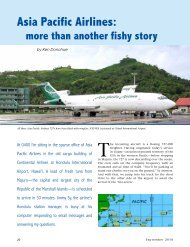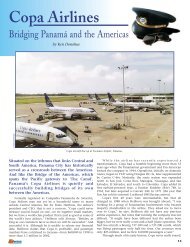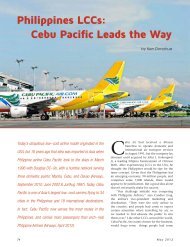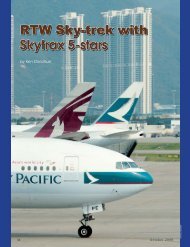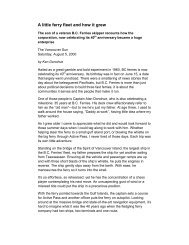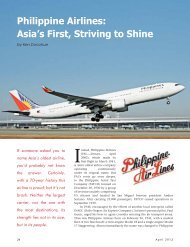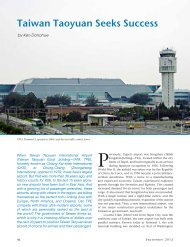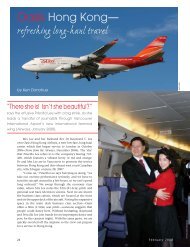Mahan Air: bringing respect to Iran - Ken Donohue
Mahan Air: bringing respect to Iran - Ken Donohue
Mahan Air: bringing respect to Iran - Ken Donohue
You also want an ePaper? Increase the reach of your titles
YUMPU automatically turns print PDFs into web optimized ePapers that Google loves.
<strong>Mahan</strong> <strong>Air</strong><br />
Bringing Respect <strong>to</strong> <strong>Iran</strong><br />
by <strong>Ken</strong> <strong>Donohue</strong><br />
CARRIE DONOHUE
<strong>Iran</strong>, known as Persia until 1935, is a country with a proud and rich his<strong>to</strong>ry (the<br />
Achaemenid, the First Persian Empire, was founded in 550 BC). Yet it is easily<br />
one of the most misunders<strong>to</strong>od nations in the world. Some are quick <strong>to</strong> vilify<br />
its people, with one world leader using the word ‘evil’ <strong>to</strong> describe the country.<br />
But <strong>Mahan</strong> <strong>Air</strong>, a private <strong>Iran</strong>ian airline, is working hard <strong>to</strong> erase the<br />
misconceptions that people have about <strong>Iran</strong>. In doing so, it is <strong>bringing</strong> <strong>respect</strong> <strong>to</strong><br />
a much-maligned country.<br />
<strong>Mahan</strong> <strong>Air</strong> has operated the <strong>Air</strong>bus A300B4 since 1999, when two former Thai <strong>Air</strong>ways International examples were acquired.<br />
CHRISTOPHER STEFANIDIS<br />
Named after a small <strong>to</strong>wn in south-central <strong>Iran</strong>, <strong>Mahan</strong> <strong>Air</strong> was<br />
formed by a son of President Rafsandjani in 1991 when the<br />
<strong>Iran</strong>ian government established a pilot program allowing<br />
private air carriers <strong>to</strong> offer comparable services <strong>to</strong> those provided<br />
by state-run <strong>Iran</strong><strong>Air</strong> (<strong>Air</strong>ways, Jan/Feb 1998). <strong>Mahan</strong> <strong>Air</strong> was one<br />
airline that <strong>to</strong>ok advantage of this new policy, and in 1992<br />
began scheduled domestic passenger operations with two<br />
Tupolev Tu-154M tri-jets; international service <strong>to</strong> Damascus<br />
followed shortly afterward. Dedicated freight flights started in<br />
1994, with a pair of Ilyushin Il-76TDs acquired from Cairo<br />
Charter and Cargo.<br />
The airline’s first few years were unremarkable in almost<br />
every way. In fact, <strong>Mahan</strong> <strong>Air</strong> was about <strong>to</strong> close its doors, but<br />
in 1997 a new management team was introduced giving the<br />
airline a better chance of success. <strong>Mahan</strong> <strong>Air</strong> expanded its<br />
international route network <strong>to</strong> include Dubai, and is <strong>to</strong>day not<br />
only one of seven airlines operating in <strong>Iran</strong>, but also the second<br />
largest. The carrier now serves 22 destinations from Tehran,<br />
including cities in Asia and Europe.<br />
<strong>Mahan</strong> <strong>Air</strong>’s recipe has been simple: combine western<br />
equipment with good service. In 1999, two <strong>Air</strong>bus A300B4s<br />
joined the fleet, another following a year later. These new<br />
aircraft put Jeddah, Saudi Arabia, on the airline’s network,<br />
and allowed <strong>Mahan</strong> <strong>Air</strong> <strong>to</strong> stretch its wings <strong>to</strong> Bangkok, then<br />
<strong>to</strong> Delhi.<br />
Six <strong>Air</strong>bus A310-300s were bought from THY Turkish<br />
<strong>Air</strong>lines in 2002, two for immediate delivery. That year, a plan<br />
<strong>to</strong> merge with another <strong>Iran</strong>ian independent airline, Kish <strong>Air</strong>,<br />
failed <strong>to</strong> materialize, as did a scheme <strong>to</strong> invest in Delsey <strong>Air</strong>lines<br />
of Belgium <strong>to</strong> offer a connection <strong>to</strong> New York.<br />
Earlier this year the airline began wet-leasing <strong>Air</strong>bus A320s<br />
and an A321 from Blue Wings of Germany. Eight examples of<br />
the A320 family are due in service next year, enabling the<br />
remaining Tu-154Ms, used primarily on domestic routes, <strong>to</strong> be<br />
phased out.<br />
Last year was a record year for <strong>Mahan</strong> <strong>Air</strong>, with more<br />
than 1.2 million passengers flown, its largest one-year <strong>to</strong>tal,<br />
representing a 42% increase over 2002. While figures were not<br />
released, the airline says that it recorded a larger profit than in<br />
any previous year.<br />
Success has not come easily for <strong>Mahan</strong> <strong>Air</strong>, however. Mahdi<br />
Bahrami, <strong>Mahan</strong>’s vice president commercial, tells <strong>Air</strong>ways that<br />
the airline’s biggest challenge is the lack of support from<br />
the government. “The state carrier, <strong>Iran</strong><strong>Air</strong>, gets all the good<br />
20 December 2004
Mahdi Bahrami, VP Commercial of <strong>Mahan</strong> <strong>Air</strong>.<br />
routes,” laments Bahrami, “we just get whatever is left.” He<br />
also suggests that while, in principle, the government accepts<br />
the idea of private airlines competing against the state<br />
companies, it is often difficult <strong>to</strong> secure support from all<br />
government departments.<br />
Some might assume that Bahrami would be bitter about the<br />
challenges his airline faces. He is not. Instead, he talks about the<br />
airline’s success in meeting the needs of its passengers and the<br />
international community. “We have a good relationship with<br />
the United Nations,” says Bahrami. “On short notice, we have<br />
flown tents and medicine <strong>to</strong> areas of the world in need.”<br />
The airline is also very timely in taking advantage of global<br />
events, as on December 22, 2001, it became the first <strong>to</strong> offer<br />
commercial flights <strong>to</strong> Kabul (Bagram) after the Taliban was run<br />
out of Afghanistan. However, the service <strong>to</strong> the Afghan capital<br />
was halted after only six months, because there was little or no<br />
security at the airport (<strong>Air</strong>ways, Oc<strong>to</strong>ber 2002). And only ten<br />
days after the July 2001 terrorist attack on the international<br />
airport in Colombo, Sri Lanka (<strong>Air</strong>ways, November 2001),<br />
<strong>Mahan</strong> <strong>Air</strong> had resumed service <strong>to</strong> that airport. At short notice,<br />
<strong>Mahan</strong> <strong>Air</strong> was called upon <strong>to</strong> transport Afghanis <strong>to</strong> Mecca for<br />
the Hajj. “We have a short chain of command,” Bahrami says<br />
with pride. “This allows us <strong>to</strong> make decisions quickly.”<br />
While the airline has tasted success, it is not about <strong>to</strong> rest on<br />
its laurels. <strong>Mahan</strong> <strong>Air</strong>’s short-term goals include concentrating<br />
on offering more internal flights and providing better service<br />
than its competi<strong>to</strong>rs. The company has a relatively limited<br />
domestic presence, serving 12 destinations—although its load<br />
fac<strong>to</strong>r on those routes is an enviable 95%—and would like <strong>to</strong><br />
start offering daily and twice-daily flights. “Less than 10 percent<br />
of <strong>Iran</strong>ians travel by ’plane,” Bahrami tells <strong>Air</strong>ways, “so there is<br />
lots of potential for growth.” <strong>Iran</strong> is a large country, about the<br />
size of Alaska, but economic conditions prevent the majority of<br />
citizens from travelling by air.<br />
For most foreigners, however, the cost of a domestic flight<br />
is still one of the best bargains anywhere in the world. Earlier<br />
this year, the price of a one-way ticket from Shiraz <strong>to</strong> Tehrān, a<br />
90-minute flight, was $30, including taxes and fees. The<br />
government regulates domestic fares and an increase of 17.2%<br />
was recently approved <strong>to</strong> compensate for fuel prices that have<br />
tripled over recent years.<br />
In July 2004, the airline increased its Düsseldorf service <strong>to</strong><br />
four times a week, from the previous three, and Birmingham<br />
became the airline’s second European destination, with twiceweekly<br />
flights from Tehrān. While many Asian and Middle<br />
Eastern airlines have found success in Manchester, <strong>Mahan</strong> <strong>Air</strong> is<br />
expecting similar success in Birmingham. The airline would like<br />
<strong>to</strong> start offering more connecting flights; such as it currently<br />
does between Düsseldorf and Bangkok. Bahrami reminds<br />
<strong>Air</strong>ways that Birmingham has a large Indian community, and<br />
<strong>Mahan</strong> <strong>Air</strong> is looking <strong>to</strong> tap in<strong>to</strong> that market by offering<br />
convenient service <strong>to</strong> Delhi, via Tehrān.<br />
“Geographically, Tehrān is well suited as a hub,” says<br />
Bahrami. “We know we can never compete with Emirates and<br />
Dubai (<strong>Air</strong>ways, November 2004), but we can be successful by<br />
offering a good product, and convenient connections.” Bahrami<br />
also says that the <strong>Iran</strong>ian government has made it easier for<br />
people <strong>to</strong> obtain transit visas. <strong>Mahan</strong> <strong>Air</strong> will also offer<br />
complimentary coach service from Manchester <strong>to</strong> Birmingham.<br />
The airline accommodates all of its connecting Delhi and<br />
Bangkok passengers, including those in economy class, in the<br />
business lounge at Tehrān’s Mehrabad <strong>Air</strong>port (IATA: THR/<br />
ICAO: OIII).<br />
<strong>Mahan</strong> <strong>Air</strong>’s first European destination was Düsseldorf,<br />
added in 2002, and it has been so successful that the airline’s<br />
main rival, <strong>Iran</strong><strong>Air</strong>, recently started service <strong>to</strong> Köln [Cologne],<br />
only 60km (40mi) away. In Asia, the airline has been committed<br />
<strong>to</strong> Bangkok, but this has recently been a challenging<br />
destination, because of ongoing international health concerns<br />
PHOTOS: CARRIE DONOHUE<br />
Passengers are taken by bus <strong>to</strong> board a <strong>Mahan</strong> <strong>Air</strong> Tupolev Tu-154M at Tehran-Mehrabad, one of three leased from Omskavia.<br />
21
Blue Wings is operating an <strong>Air</strong>bus A321 (D-ANJA) and two A320s (EP-MHJ pictured below) for <strong>Mahan</strong> <strong>Air</strong>.<br />
CARRIE DONOHUE<br />
such as SARS (<strong>Air</strong>ways, September<br />
2003) and avian flu. During the<br />
summer months, <strong>Mahan</strong> <strong>Air</strong> operates<br />
a number of popular charters <strong>to</strong><br />
destinations such as the Maldives<br />
and Turkey.<br />
While <strong>Mahan</strong> <strong>Air</strong> does not serve<br />
North America directly, it has<br />
developed a successful relationship<br />
with German carrier LTU International.<br />
In 2003, both airlines cooperated on<br />
offering service between Los Angeles<br />
and Tehrān, through LTU’s base at<br />
Düsseldorf. This year, the trans-Atlantic<br />
connection has been increased <strong>to</strong><br />
include Toron<strong>to</strong> and Miami, in<br />
addition <strong>to</strong> the Los Angeles route,<br />
which has one of the best connection<br />
times in the region. “Along with our<br />
partner, LTU, we can offer less than two<br />
hours’ connection between <strong>Iran</strong> and<br />
North America,” says Bahrami. “No<br />
other airline can claim this.”<br />
A six-and-a-half-hour technical<br />
delay marred our flight <strong>to</strong> Tehrān<br />
from Düsseldorf. Once aboard the<br />
<strong>Air</strong>bus A310, passengers were offered a<br />
candy before takeoff, and safety<br />
announcements were given in Farsi<br />
and English. Service from the flight<br />
attendants was very good, considering<br />
the wait they had also endured. During<br />
the five-hour flight the only negative<br />
aspect was in-flight entertainment<br />
(IFE), which, in economy class,<br />
consisted only of the moving map<br />
display. The audio channel did not<br />
work at my seat, and I noticed other<br />
passengers having similar problems.<br />
<strong>Iran</strong>ians themselves may not expect a<br />
good IFE product, but international<br />
passengers accus<strong>to</strong>med <strong>to</strong> other airlines<br />
surely will.<br />
Business class on the return fight<br />
was good, although there is room for<br />
improvement. Again, the cabin<br />
attendants provided excellent service.<br />
A selection of juices and a small dish of<br />
pistachios were served before takeoff,<br />
along with Persian and English<br />
newspapers and magazines. A fresh<br />
rose was placed on each passenger’s<br />
tray table with breakfast. We were offered a selection of hot items—which could<br />
have been warmer—and one movie was played on a screen at the front of the cabin.<br />
Both meals served during the flight <strong>to</strong> Düsseldorf were impressive. However, one<br />
disappointment was that the business class seats were not equipped with footrests. On<br />
balance, <strong>Mahan</strong> <strong>Air</strong>’s in-flight product is good. Cabin attendants are friendly and<br />
attentive, and with management’s commitment <strong>to</strong> providing better service there is no<br />
22 December 2004<br />
MAHAN AIR<br />
IAN BOWLEY
eason why standards could not match the best in the region.<br />
<strong>Mahan</strong> <strong>Air</strong> takes any schedule disruption seriously, and has<br />
a policy of the airline’s managing direc<strong>to</strong>r being immediately<br />
made aware of any delay over 15 minutes. The airline’s<br />
international affairs direc<strong>to</strong>r, Hossein Hosseini, was very<br />
apologetic when we arrived in Tehrān, and said that the delay<br />
was unprecedented. I am apt <strong>to</strong> believe him after reading a<br />
newspaper article that lauds <strong>Mahan</strong> <strong>Air</strong> as having the best<br />
on-time performance amongst <strong>Iran</strong>ian airlines, with an average<br />
delay of only five minutes during the first quarter of 2004. The<br />
airline was also quick <strong>to</strong> take care of its Bangkok passengers,<br />
once it was determined they would miss their connection in<br />
Tehrān. Arrangements were made for them <strong>to</strong> travel <strong>to</strong> the Thai<br />
capital on another carrier.<br />
Cus<strong>to</strong>ms and immigration at Mehrabad <strong>Air</strong>port was<br />
efficient and hassle-free. Built in 1941, the airport has two<br />
international terminals, which are connected <strong>to</strong> each other, and<br />
a domestic terminal a short distance away. The international<br />
terminal is equipped with only three airbridges, and because of<br />
the high cost <strong>to</strong> use them, <strong>Mahan</strong> <strong>Air</strong> has opted for remote<br />
stands, busing passengers <strong>to</strong> and from the terminal. The new<br />
Imam Khomeini International <strong>Air</strong>port (ICAO: OIIE) was opened<br />
briefly in May 2004, then closed after two flights because of a<br />
dispute between the government and the company hired <strong>to</strong><br />
provide security (Business Flyer, <strong>Air</strong>ways, November 2004).<br />
Initially, flights <strong>to</strong> Dubai were supposed <strong>to</strong> begin operating out<br />
of the new airport, some 40km (25mi) south of Tehrān.<br />
Construction work on OIIE began 30 years ago, and<br />
has been marked by controversy. The plan was <strong>to</strong> operate<br />
international flights from the airport, while domestic services<br />
would continue at Mehrabad, something not welcomed by most<br />
connecting passengers. Bahrami tells <strong>Air</strong>ways that passengers<br />
would need at least two hours <strong>to</strong> connectæone hour for ground<br />
transport, and another hour <strong>to</strong> check in. “Moving our<br />
operations <strong>to</strong> the new airport is not a challenge, but a<br />
nightmare,” admits Bahrami.” The government has promised<br />
that a new domestic terminal will be built at Imam Khomeini,<br />
but, for the time being, all flights are still using Mehrabad.<br />
<strong>Mahan</strong> <strong>Air</strong> was originally based in Kermān, in southern<br />
<strong>Iran</strong>, but the airline found it more efficient <strong>to</strong> center its<br />
operations in Tehrān. The company still operates its training<br />
center in Kermān, which is home <strong>to</strong> the airline’s <strong>Air</strong>bus A300B<br />
simula<strong>to</strong>r. Maintenance is performed in Tehrān, at Mehrabad, in<br />
a hangar that can accommodate eight aircraft, and is owned and<br />
shared by <strong>Mahan</strong> <strong>Air</strong>, <strong>Iran</strong><strong>Air</strong>, SOGERMA EADS France, and <strong>Iran</strong><br />
<strong>Air</strong>craft Industries. The installation is JAR (European)-certified,<br />
and <strong>Mahan</strong> <strong>Air</strong>’s mechanics are trained by <strong>Air</strong>bus.<br />
Much is made of the trade embargo placed on <strong>Iran</strong> by the<br />
United States, especially when it comes <strong>to</strong> aircraft safety and<br />
maintenance, but Bahrami plays down the<br />
suggestion that it has a big impact. “It affects us<br />
somewhat, but aircraft manufacturers have a<br />
responsibility <strong>to</strong> support the airplanes they<br />
make, which includes ensuring the availability of<br />
spare parts.”<br />
Bahrami tells <strong>Air</strong>ways that he is very proud of<br />
<strong>Mahan</strong> <strong>Air</strong>’s turnaround, and suggests that the<br />
airline’s continued success depends a lot on<br />
market conditions, while trusting in God for a<br />
better future. Yet <strong>Mahan</strong> <strong>Air</strong> is not relying solely<br />
on divine intervention; as a sign of its<br />
commitment <strong>to</strong> improve in-flight service, the<br />
airline has built a new flight kitchen next <strong>to</strong><br />
the airport.<br />
<strong>Mahan</strong> <strong>Air</strong>’s latest marketing slogan is ‘Expect<br />
Great Things!’ Many pretend, but few airlines can<br />
actually deliver on such a statement, and while<br />
CARRIE DONOHUE<br />
Fast Facts—<strong>Mahan</strong> <strong>Air</strong><br />
IATA:W5 ICAO: IRM IATA/ARC: 537 Radio: <strong>Mahan</strong> <strong>Air</strong><br />
PO Box 14515-411 Tel: +98 21 407 6081-3<br />
Tehrān Fax: +98 21 407 0404<br />
Islamic Republic of <strong>Iran</strong> Email: international@<strong>Mahan</strong><strong>Air</strong>Lines.com<br />
SITA: THRMCWS<br />
Website: www.mahanairlines.com<br />
Founded: 1991<br />
Start date: 1992<br />
MD: Hamid Arabnejad<br />
Ownership:Mol-Al-Movahedin Credit Cooperative (96%)<br />
Employees: 1,000<br />
Cities served: Domestic: Bām, Bandar-e ‘Abbas, Esfahan, Īrānshahr,<br />
Kermān, Kish, Mashhad, Qeshm, Shirāz, Sīrjan [Sa‘īdābād], Tabrīz, Tehrān,<br />
Zābol International: Bahrain, Bangkok, Birmingham, Colombo, Delhi, Dubai<br />
[Dubayy], Düsseldorf, Īstanbul, Jeddah, Sharjah [Ash Shāriqah]<br />
Traffic<br />
(January-June 2004, % over prior year period)<br />
RPKs: 923 million (+64%)<br />
Passengers: 761,000 (+60%)<br />
Load fac<strong>to</strong>r: 71% (+10 points)<br />
Fleet<br />
Type No Seats Engines<br />
<strong>Air</strong>bus A320 2 Y156 IAE V2527-A5<br />
Tupolev Tu-154M 3 Y164/166 SO D-30KU-154-II<br />
<strong>Air</strong>bus A321 1 Y186 CFMI CFM56-5B1/2P<br />
<strong>Air</strong>bus A310-300 (ET) 2 C14Y168 GE CF6-80C2A2<br />
<strong>Air</strong>bus A300B4 3 C24Y221 GE CF6-50C2<br />
On order<br />
A310-300 4 (from THY)<br />
there is much work <strong>to</strong> be done, <strong>Mahan</strong> has the perfect<br />
ingredients <strong>to</strong> become one of the world’s best airlines. Despite<br />
the negative rhe<strong>to</strong>ric, <strong>Iran</strong> is a safe, his<strong>to</strong>ric, and beautiful<br />
country. Its people are welcoming and hospitable. And <strong>Mahan</strong><br />
<strong>Air</strong> reflects those qualities. ✈<br />
An A310 outside the FARS Co maintenance hangar at Tehran. Both of<br />
<strong>Mahan</strong> <strong>Air</strong>’s A310-300s were acquired from THY Turkish <strong>Air</strong>lines, and<br />
another four are expected from the same source.<br />
23


